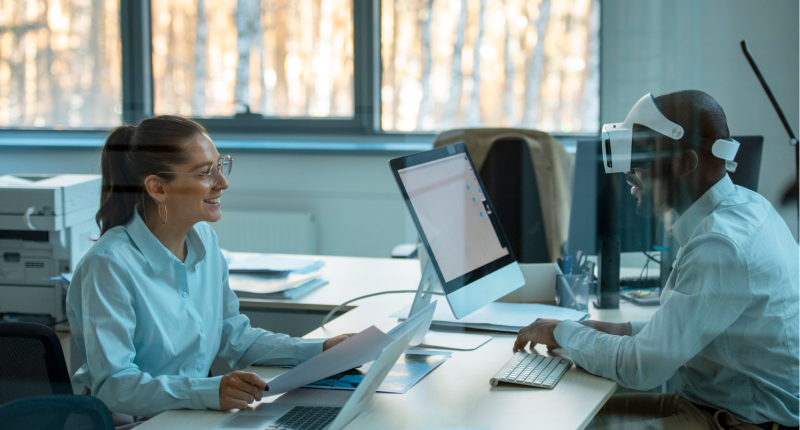Artificial intelligence is indeed reshaping modern workplaces, offering an unprecedented blend of creativity and efficiency. The rapid advancement of AI technologies is propelling organizations into an era of transformation, with automation and data-driven insights leading the way. In healthcare, AI is revolutionizing patient care through predictive analytics and robotic surgery, while in finance, it’s optimizing risk assessment and propelling algorithmic trading to new heights. Across various sectors, from manufacturing to customer service, AI-powered tools like chatbots and robotics are streamlining processes and enhancing efficiency.
However, AI’s impact goes beyond automation; it’s a driving force behind innovation. By automating routine tasks, AI liberates human workers to focus on creative problem-solving and strategic thinking, propelling the pace of innovation. Businesses are leveraging AI to develop innovative products, precisely target marketing campaigns, and enhance customer experiences. AI-driven language models, such as GPT, are transforming content creation, chatbots, and virtual assistants with natural language understanding and generation capabilities.
As organizations embrace AI-driven automation and analytics, they are standing at the threshold of a transformative era where efficiency converges with innovation, forever reshaping the workplace. And, as a nod to your request, incorporating software for teams into this AI-driven landscape can further amplify efficiency and innovation, fostering a holistic approach to productivity and success.
Streamlining Work Processes
AI-driven chatbots, for instance, are revolutionizing customer service by providing quick and accurate responses to inquiries, freeing up human agents to handle more complex issues. Workflow automation, another AI application, reduces the administrative burden on employees by automating repetitive tasks, such as data entry and document routing, allowing them to focus on high-value activities. Furthermore, AI is enhancing data analysis and decision-making processes. Predictive analytics, powered by AI algorithms, sift through vast datasets to identify trends and insights that might be elusive to human analysts.
AI-driven data analytics can uncover hidden patterns and trends within large datasets, which can be a wellspring of inspiration for generating fresh ideas. By presenting employees with actionable data-driven insights, AI empowers them to make informed decisions, identify emerging opportunities, and drive innovation across various domains.
Moreover, AI plays a role in creative content creation. AI-powered tools can draft articles, generate marketing copy, and create artwork, allowing creative professionals to focus on higher-level creative thinking and strategy. In the real world, we’ve witnessed AI-driven innovation in sectors like healthcare, where machine learning algorithms assist in drug discovery, or in the arts, where AI-generated music and visual art are gaining recognition. The synergy between AI’s analytical capabilities and its potential for creative content generation is driving a new era of innovation in the workplace, where efficiency truly meets innovation.
AI in Talent Acquisition and HR
AI is revolutionizing talent acquisition, recruitment, and human resources, reshaping how organizations find, onboard, and engage with talent. In talent acquisition, AI-powered tools are dramatically enhancing the candidate screening process. Advanced algorithms can quickly analyze resumes, cover letters, and online profiles to identify the most qualified candidates. This expedites hiring and reduces bias by focusing on skills and qualifications rather than personal characteristics.
AI is also playing a significant role in improving employee engagement. Machine learning algorithms can analyze employee data to identify job satisfaction and turnover trends, enabling organizations to take proactive steps to retain top talent. Additionally, AI-driven tools can personalize employee experiences by recommending training and development opportunities tailored to individual career goals. Companies like IBM and Hilton are already harnessing the power of AI in HR, resulting in more efficient talent acquisition, smoother onboarding processes, and higher employee engagement levels. As AI continues to evolve, its applications in HR will likely expand, further blurring the lines between efficiency and innovation in the workplace.
Challenges and Ethical Considerations
While AI in the workplace offers remarkable potential, it also raises significant challenges and ethical considerations that demand our attention. One of the foremost concerns is job displacement. Many experts believe AI will augment human capabilities, allowing employees to focus on higher-level tasks while AI handles repetitive and mundane work. Nevertheless, it is crucial for organizations to proactively retrain and upskill their workforce to adapt to these changes.
Data privacy is another critical ethical consideration. AI relies on vast amounts of data to operate effectively, and collecting and using this data raises questions about individuals’ privacy and security. Organizations must prioritize robust data protection measures and adhere to strict ethical guidelines when handling sensitive information. Furthermore, the issue of algorithmic bias requires careful attention. AI algorithms can inadvertently perpetuate biases present in historical data, leading to discriminatory outcomes. Organizations must implement fair and transparent AI algorithms to combat this and regularly audit their AI systems to ensure they are not reinforcing bias. Responsible AI deployment, combined with mitigation strategies that address these challenges and ethical concerns, will be paramount in harnessing the full potential of AI while preserving a fair and equitable workplace environment.
AI and Human Collaboration
As AI takes on repetitive and data-intensive responsibilities, employees can engage in more meaningful and innovative endeavors. This collaborative synergy between humans and AI will result in work environments where creative problem-solving, critical thinking, and adaptability take center stage. To thrive in this evolving landscape, upskilling and adaptability will be essential for employees. They must acquire new skills and knowledge to effectively collaborate with AI systems and leverage them as powerful tools in their professional endeavors.
Beyond simple work automation, AI and human collaboration have much more promise. AI may act as a knowledge partner with its insights, forecasts, and suggestions, enabling staff members to make well-informed decisions. Research, data analysis, and original content creation may all benefit from it. Healthcare, banking, manufacturing, and education are just a few industries already seeing the game-changing effects of AI-human cooperation. The combination of human intelligence and technology is projected to boost innovation, productivity, and the creation of new possibilities in the workplace as AI develops and becomes more integrated into all facets of work.





